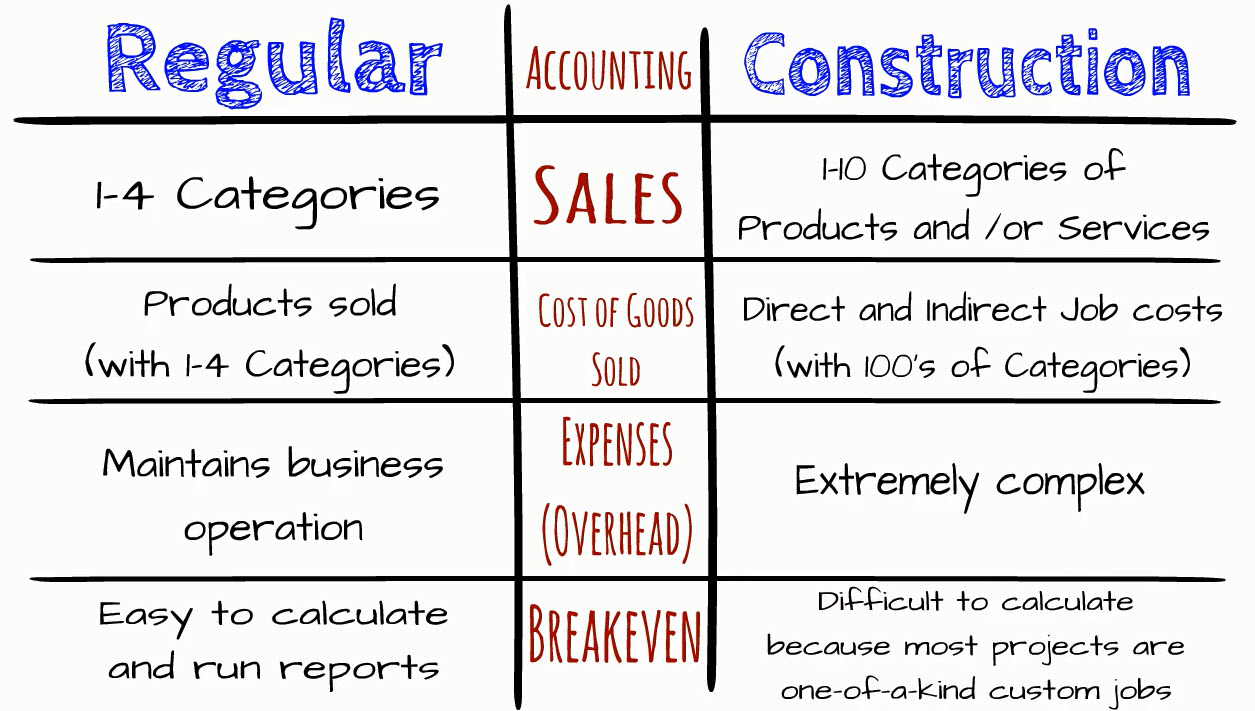Construction Accounting: How to Maintain Accurate Records and Improve Cash Flow
Construction Accounting: How to Maintain Accurate Records and Improve Cash Flow
Blog Article
Understanding the Importance of Construction Audit for Successful Project Management

Role of Construction Accounting
Building audit works as the backbone of monetary administration in the construction market, making certain that jobs are completed within budget and economic goals are satisfied. construction accounting. This specific bookkeeping strategy addresses the unique challenges encountered in building and construction tasks, including differing task periods, rising and fall costs, and multiple stakeholders
Among the primary roles of building accountancy is to offer exact expense evaluation and tracking throughout the project lifecycle. This facilitates informed decision-making, enabling task managers to adjust timelines and resources properly. Additionally, building and construction bookkeeping improves capital monitoring by checking accounts payable and receivable, hence ensuring that funds are readily available for timely settlements to subcontractors and vendors.
Moreover, building bookkeeping help in compliance with industry regulations and coverage requirements. It outfits job supervisors with the needed monetary data to prepare in-depth monetary declarations, which are important for audits and economic evaluations. By preserving clear documents, building and construction bookkeeping fosters openness and accountability, important elements in building trust amongst stakeholders. Inevitably, the function of building and construction bookkeeping expands past plain monetary tracking; it is essential to calculated planning and functional effectiveness, driving the success of building and construction projects in an affordable landscape.
Secret Elements of Building Accounting

Budgeting develops an economic structure that overviews project execution, enabling managers to designate sources efficiently and expect prospective financial challenges. Accurate expense monitoring is necessary for surveillance costs in real-time, aiding to recognize variations between forecasted and real expenses. This makes it possible for prompt changes to keep the task on budget plan.
In addition, monetary coverage offers stakeholders with a clear photo of the job's economic wellness. Routine records, such as revenue and loss statements and capital analyses, help with informed decision-making and enhance transparency amongst all events involved.
Furthermore, conformity with industry policies and audit standards is crucial. This makes certain that monetary techniques are not only reliable but also authorized, securing the organization against legal effects. By incorporating these crucial components, building audit fosters an organized technique to handling funds, eventually adding to the effective conclusion of construction tasks.
Advantages for Project Managers
Leveraging effective construction audit practices provides task supervisors with a multitude of advantages that enhance both functional effectiveness and economic oversight. One substantial benefit is boosted budget plan monitoring. Accurate tracking of earnings and costs permits task managers to keep track of financial performance in actual time, making certain jobs continue to be within budget plan and facilitating timely changes when required.
In addition, construction accounting enhances cash flow management, enabling task supervisors to anticipate financial requirements and maximize resource appropriation. By comprehending money inflows and discharges, they can better handle repayments to distributors, subcontractors, and workers, thereby staying clear of pricey hold-ups.
Furthermore, robust bookkeeping systems offer thorough coverage capabilities. Job managers can create records that supply insights right into job profitability, cost variances, and source use. This data-driven method cultivates educated decision-making, permitting supervisors to recognize possible concerns proactively and implement restorative steps.
Finally, adherence to building and construction accountancy standards makes certain conformity with lawful and regulative demands, lessening the danger of charges or disputes. In general, effective building and construction audit furnishes task managers with the devices necessary to drive job success, boost stakeholder self-confidence, and advertise long-lasting business growth.
Usual Difficulties in Building And Construction Accountancy
Lots of project managers experience significant obstacles in construction audit that can impede job success. Among the primary challenges is the intricacy of tracking multiple task sites, each with distinct budget plans, timelines, and source allocations. This requires thorough attention to detail, which can be frustrating without a durable bookkeeping system in location.
Furthermore, changing product prices and labor rates can complicate budget plan monitoring, making accurate projecting hard. Project supervisors commonly have a hard time to resolve these costs with actual expenses, causing possible economic discrepancies.
Additionally, construction accountancy entails conformity with numerous guidelines, consisting of tax obligation responsibilities and labor legislations. Browsing these regulations can be daunting, particularly for supervisors that might not have a strong accounting history.
Another considerable obstacle is handling cash flow, which is vital in the building and construction market. Hold-ups in invoicing, payments from customers, or unexpected task modifications can create capital scarcities, endangering the project's development.
Finally, effective interaction in between job managers, accounting professionals, and area groups is crucial. Misunderstandings can result in incorrect monetary reporting, better complicating task monitoring initiatives. Resolving these challenges proactively is vital for successful construction audit.

Best Practices for Effective Audit
While navigating the intricacies of building and construction audit can be difficult, taking on best practices can considerably improve monetary monitoring and project success. One fundamental method is preserving precise and timely documents. Implementing robust audit software application customized to building and construction tasks can simplify information entry, invoicing, and reporting, conserving and reducing errors time.
Additionally, establishing a clear budget plan and regular tracking against this spending plan are essential. Employing a system of routine monetary evaluations permits project supervisors to recognize variances early, assisting in prompt decision-making. It is likewise necessary to separate task costs right into straight and indirect groups, allowing clearer understandings right into profitability.
One more best method involves promoting open communication among all stakeholders. Routine updates and collective discussions concerning economic condition can make certain every person is lined up and educated. Training personnel in construction-specific audit principles further enhances proficiency and accuracy.
Lastly, guaranteeing compliance with appropriate bookkeeping criteria and policies is non-negotiable. Regular audits and inner evaluations contribute to openness and accountability, developing count on with customers and stakeholders. By concentrating on these my sources finest practices, building companies can enhance their accounting procedures, ultimately driving project success and monetary stability.
Verdict
Finally, building and construction accounting plays a crucial duty in guaranteeing successful job management by assisting in accurate economic oversight and enhancing decision-making. By from this source integrating crucial elements such as expense estimate, capital monitoring, and compliance, job supervisors can navigate usual challenges and take advantage of ideal methods for efficient bookkeeping. Ultimately, a robust building and construction bookkeeping framework not only safeguards budget honesty however also adds to the general economic health of construction projects, cultivating sustainable success within the market.
By integrating these essential elements, construction accountancy fosters a structured method to handling monetary sources, ultimately adding to the successful conclusion of construction projects.
Exact tracking of costs and earnings enables project supervisors to monitor economic efficiency in actual time, making certain jobs remain within spending plan and facilitating timely modifications when essential.
Project managers can generate records that offer insights into job profitability, expense variances, and source usage.Numerous project supervisors run into significant obstacles in building accountancy that can impede project success. construction accounting. Ultimately, a durable building accountancy framework not only safeguards budget honesty however also adds to the general economic health and find this wellness of building and construction tasks, promoting lasting success within the sector
Report this page